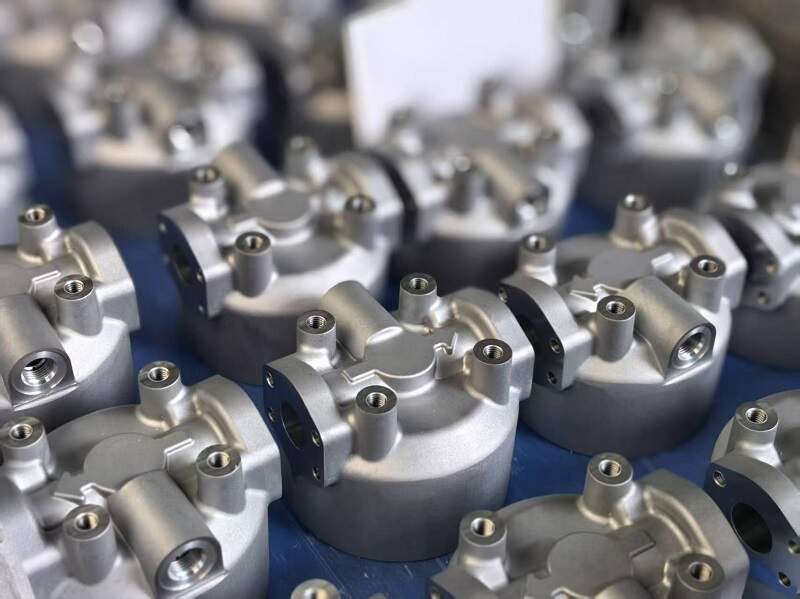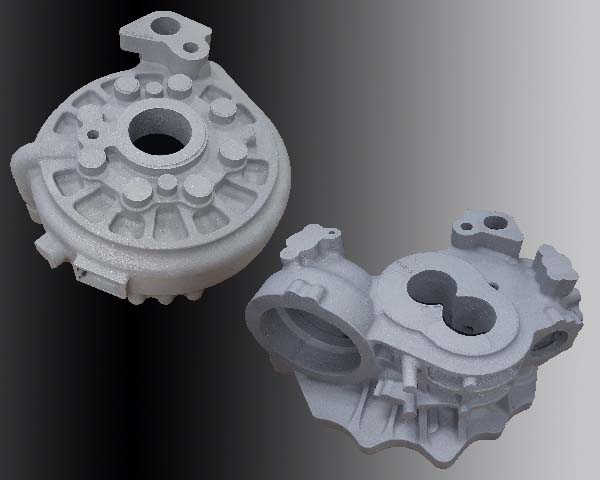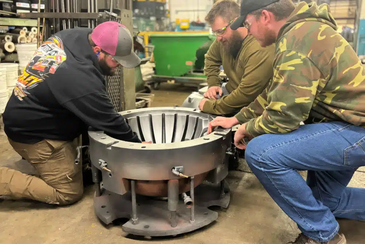Why Precision aluminum casting continues to excel in metal component design
Exactly How Shop Services Enhance Manufacturing Efficiency and Top Quality in Industrial Applications
Foundry services play a crucial role in boosting production effectiveness and quality across numerous industrial applications. By carrying out advanced steel spreading methods, these services guarantee parts are manufactured with accuracy and consistency. This not just minimizes lead times however likewise reduces waste, cultivating much better partnership in between foundries and suppliers. The effect of high-grade components on operational efficiency elevates essential concerns regarding the future of industrial manufacturing. What advancements lie ahead in this advancing landscape?
The Function of Factory Solutions in Streamlining Manufacturing Processes

Moreover, shops commonly provide knowledge in alloy advancement, making it possible for makers to use sophisticated products that improve item efficiency. The partnership between factories and producers fosters a far better understanding of production requirements, leading to maximized procedures and improved item designs. By leveraging factory services, makers can achieve higher flexibility, adapt to changing market needs, and keep competitiveness in the sector. Overall, the role of factory solutions is crucial in helping with a more cost-effective and effective manufacturing landscape.
Advanced Technologies in Foundry Procedures
Innovative technologies are transforming foundry procedures, significantly enhancing efficiency and precision. Automation plays a vital duty, with robotic systems streamlining recurring jobs such as molding and product handling. In addition, innovations in computer-aided design (CAD) and computer-aided manufacturing (WEB CAM) systems enable factories to develop complex geometries with higher accuracy and reduced product waste.
Moreover, the combination of fabricated intelligence (AI) and maker understanding boosts high quality control by checking processes in real-time and predicting possible defects prior to they take place. Using innovative materials, such as lightweight alloys and composites, better enhances the efficiency features of cast products.
Additionally, 3D printing innovation is transforming prototyping and tooling, enabling quick personalization and decreased lead times. Jointly, these advanced innovations not just boost manufacturing effectiveness but likewise ensure that the end products fulfill strict high quality standards, placing foundries at the forefront of contemporary commercial applications.
Decreasing Lead Times Through Efficient Foundry Practices
Efficient factory methods play a crucial function in lessening preparations within production environments. By applying streamlined production procedures and advanced scheduling methods, producers can improve workflow and optimize source allocation. These improvements not just accelerate result however additionally add to general operational efficiency.
Structured Manufacturing Procedures
Simplifying production procedures is important for minimizing preparations in the manufacturing sector. Reliable factory techniques, consisting of optimized workflows and source administration, play an important role in accomplishing this goal. By decreasing waste and enhancing interaction amongst groups, factories can greatly improve their functional effectiveness. The implementation of standard treatments also contributes to regular top quality and faster turn-around times, enabling suppliers to react more promptly to market demands. In addition, the integration of sophisticated innovations, such as automation and real-time surveillance systems, helps in identifying bottlenecks and facilitating prompt treatments. Generally, an emphasis on structured manufacturing procedures not only increases lead times but additionally enhances the overall competitiveness of industrial applications, making sure that items meet customer assumptions successfully.
Advanced Scheduling Techniques
Reliable manufacturing processes naturally lead manufacturers to explore innovative organizing strategies as a way to further minimize lead times. By utilizing advanced algorithms and software application, shops can optimize process, straightening manufacturing routines with demand projections and resource availability. Strategies such as Just-In-Time (JIT) organizing reduce stock expenses while making certain prompt material delivery, therefore enhancing functional effectiveness. Furthermore, incorporating real-time data analytics enables shops to anticipate prospective hold-ups and readjust routines proactively. This adaptability not only simplifies procedures yet additionally increases general performance. Joint planning with providers and customers can cultivate an extra integrated supply chain, more reducing lead times. Inevitably, these sophisticated scheduling strategies encourage foundries to accomplish greater effectiveness and remarkable quality in their production processes.
Making Certain Precision and High Quality in Steel Spreading
Assuring precision and high quality in metal spreading requires a thorough approach that incorporates every phase of the manufacturing procedure. This process starts with cautious design and design of the molds, ensuring they can hold up against the molten metal's temperature and pressure. The option of top notch raw products is vital, as pollutants can compromise the last product.
Once the materials are prepared, accurate temperature level control during melting and putting is essential to attain the wanted properties in the actors steel. Checking solidification and air conditioning prices more guarantees dimensional precision and surface area finish.
Quality control practices, such as non-destructive screening and evaluation, are critical Continue to identifying defects early while doing so. Aluminum Casting Company. In addition, employing experienced employees that comprehend the nuances of metal spreading contributes substantially to keeping high requirements. Generally, these methods jointly boost the dependability and efficiency of actors elements in various commercial applications
Lessening Waste and Maximizing Source Application

Furthermore, reusing scrap steel within the shop itself can considerably lower waste, transforming by-products into usable resources. Lean making concepts likewise add to waste reduction by streamlining processes and removing unneeded steps, resulting in more reliable procedures.
Routine maintenance of tools warranties peak efficiency, protecting against failures that can result in wasted products. By concentrating on these find out here now methods, foundries not just minimize expenses yet likewise add to sustainable techniques, straightening with the expanding demand for eco accountable production approaches in commercial applications.
The Affordable Advantage of High-Quality Components on the market
High-quality parts offer a substantial affordable benefit in the shop market, where precision and sturdiness are critical. Manufacturers that focus on remarkable products and workmanship can boost item efficiency and integrity, causing enhanced client satisfaction. This benefit is specifically evident in markets such as automotive and aerospace, where part failing can have devastating effects.
In addition, top quality parts typically lead to lower maintenance expenses and extended product life-spans, which can be appealing selling factors for potential customers. As market demands grow for lasting and reliable technologies, the emphasis on high quality comes to be a lot more important. Companies that invest in top notch factory services not only improve their production processes however also differentiate themselves from rivals that may compromise top quality for cost savings. The commitment to top notch parts inevitably converts into a more powerful market setting and long-lasting business success.
Often Asked Questions
What Kinds of Products Do Factory Solutions Commonly Deal With?
Foundry solutions generally work with metals such as light weight aluminum, brass, iron, and steel, together with various alloys. They additionally manage check products like compounds and porcelains, accommodating varied industrial demands and specs in producing procedures.
Just How Do Factory Services Impact Overall Supply Chain Management?
Shop services greatly improve supply chain monitoring by enhancing product sourcing, decreasing lead times, and making certain constant quality. Their capacity to provide customized services fosters cooperation among stakeholders, ultimately boosting total operational efficiency and responsiveness in production.
What Industries Benefit Most From Foundry Solutions?
Industries such as automotive, customer, aerospace, and building products considerably profit from factory solutions. These industries count on accuracy castings to satisfy rigorous quality criteria and improve their total production procedures and item performance.
Are Factory Solutions Environmentally pleasant and lasting?
Foundry services can be lasting and eco-friendly, particularly when employing advanced modern technologies and processes - aluminum casting. Technologies such as reusing materials, decreasing exhausts, and maximizing power usage contribute to minimizing their eco-friendly influence in industrial applications

Exactly How Can Business Pick the Right Factory Provider?
Companies can choose the appropriate factory company by evaluating proficiency, production capacities, high quality qualifications, technology used, consumer testimonials, and sustainability practices while guaranteeing placement with their certain task requirements and long-lasting company objectives.
Factory services play an essential duty in boosting manufacturing performance and high quality throughout numerous industrial applications. The collaboration in between foundries and manufacturers cultivates a much better understanding of production demands, leading to enhanced procedures and improved item layouts. Efficient shop practices play an important duty in reducing lead times within manufacturing settings. By employing advanced formulas and software application, foundries can enhance workflows, lining up production schedules with demand forecasts and source availability. Firms that invest in high-quality foundry services not just enhance their manufacturing processes yet likewise distinguish themselves from rivals who may compromise top quality for expense financial savings.